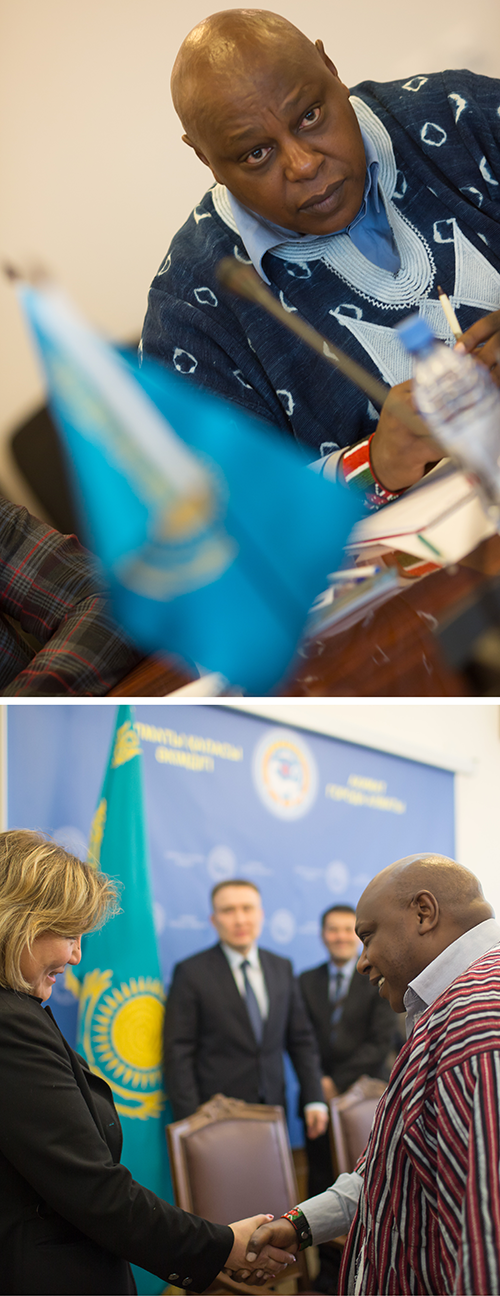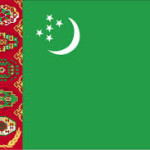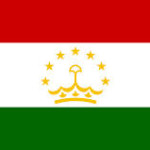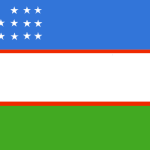ASTANA/GENEVA – United Nations Special Rapporteur Maina Kiai completed an official visit to Kazakhstan on Tuesday by challenging the Government to build on its achievements in the economic arena over the last 23 years by facilitating and opening up democratic space, in particular the rights to freedom of peaceful assembly and of association.
He also expressed disappointment at an incident where his sources appeared to come under police surveillance. Mr. Kiai said that on 23 January, after he left a meeting with civil society representatives in Aktau, unknown persons were photographing individuals exiting the building “in a manner commonly associated with secret police surveillance.”
The Special Rapporteur reported the incident to police, who later produced a suspect, along with a written “confession.” Mr. Kiai said that the suspect was unequivocally not the same person who was taking photographs.
The Special Rapporteur noted that the Government’s tendency to focus on restrictions, rather than the rights themselves, had resulted in a situation where rights were treated as privileges to be granted at the discretion of State authorities.
He applauded the Government’s efforts to ensure cohesion, but noted that “maintaining stability is often misused to wrongfully curtail the rights to freedom of peaceful assembly and of association.”
“People who are not allowed to air their grievances peacefully are more likely to air them violently, or find succor in extremist ideologies,” he said.
Right to freedom of peaceful assembly
The Special Rapporteur said the Government’s approach to regulating peaceful assemblies was one of the most pressing issues. The right is guaranteed by Kazakhstan’s Constitution, but all peaceful assemblies must be authorised by local authorities, and even then, are limited to specific, government-designated sites.
During the Special Rapporteur’s visit, individuals from around the country announced plans to organize peaceful assemblies in eight cities between 24 and 27 January 2015. According to sources, however, the local authorities rejected the requested location of these assemblies, while some people were held in detention, preventing them from even seeking to exercise their rights. A few assemblies eventually took place in designated areas.
The Special Rapporteur said that authorities justified restrictions by citing traffic issues and concerns that assemblies are disruptive and harm “the rights of others.” These are legitimate concerns, the expert said, but should not supersede the right to freedom of peaceful assembly.
“International human rights law is clear that limitations on this right cannot impair the essence of the right itself,” Mr. Kiai said. “Unfortunately, in Kazakhstan today the freedom of assembly is treated as a privilege, or a favor, rather than a right.”
The right to freedom of association
The right to freedom of association is also nominally guaranteed by Kazakhstan’s Constitution, but Mr. Kiai said that a web of laws and practices limits the freedom of political parties, public associations, trade unions and religious associations to operate.
The law regulating the establishment of political parties, for example, imposes onerous obligations prior to registration, including high initial membership requirements and extensive documentation. Mr. Kiai also raised concerns that the executive branch has responsibility to register political parties – entities that will ultimately compete with it for power.
The political association Alga! was denied registration after seven years of trying to register as a political party, ostensibly because membership of the party was never certified by authorities.
Sources also told the Special Rapporteur that several public associations have been denied registration based on what appear to be flimsy reasons, such as mistakes in completing the application, discrepancies in translation of Kazakh-Russian texts, or on the grounds that an association with similar objectives already existed.
“Although authorities repeatedly make reference to the ‘rule of law’, the practice in Kazakhstan reflects strong adherence to ‘rule by law’,” Mr. Kiai said. “Law is meant to serve people, rather than people serving the law.”
During his nine-day mission, which included visits to Almaty, Astana and Aktau, Mr. Kiai met State officials, members of the judiciary and of Parliament, members of civil society, and the diplomatic community.
He also visited Zhanaozen, where clashes between police and protesters in 2011 led to the deaths of at least 14 people. Mr. Kiai noted that there was “conflicting information” about the event, and urged that the government to allow an independent international inquiry.
The Special Rapporteur will present a final report on his visit to the Human Rights Council during its 29th session in June 2015.
This press release is also available in Russian on our site.
A full version of this press release is available in English and Chinese via OHCHR.
More on the Special Rapporteur’s visit to Kazakhstan:
Maina Kiai’s full statement at the conclusion of his visit (English / ру́сский язы́к)
Photos from the Special Rapporteur’s visit to Kazakhstan
Video of the Special Rapporteur’s statement at the conclusion of his visit (via YouTube)

 Tweet
Tweet
 Facebook
(0)
Facebook
(0) 






